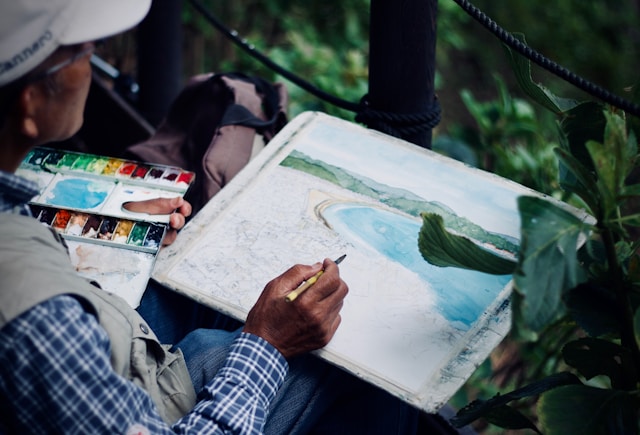
Discover essential tips to choose the perfect retirement home. Learn to assess facilities and the care you will receive to make an informed decision. Enjoy retirement!

This guide gets into the world of hobbies and crafts for seniors, aiming to inspire and motivate older adults to embrace new challenges and revisit past passions. We will highlight the vast amount of activities available, the incredible benefits they offer, and the ways to integrate them into daily life. The objective is to show how engaging in hobbies and crafts can significantly contribute to a richer, more vibrant lifestyle after retirement.
Hobbies and crafts are essential after we retire. We move from spending 8 hours per day at work, whether we want it or not, to suddenly having all that time free. Not finding an engaging activity can let in us an absence of purpose, and hours in the day can get to be very long. However, in this section, instead of focusing on the disadvantages of not having crafts and hobbies, we are going to highlight the benefits of having them.
Engaging in hobbies and crafts acts as a stimulus for the brain, promoting mental agility and cognitive health.
Activities that require concentration, problem-solving, and creativity can help maintain and even improve cognitive functions, reducing the risk of cognitive decline and diseases such as Alzheimer’s and dementia.
Whether it’s solving a puzzle, learning a new craft, or mastering a piece of music, these activities challenge the brain, keeping it active and engaged.
Many hobbies also contribute to seniors’ physical health by encouraging movement and dexterity. Gardening, for example, combines physical activity with the tranquility of being outdoors, offering both exercise and a connection with nature.
Similarly, crafts like knitting or woodworking can enhance hand-eye coordination and maintain fine motor skills.
-These activities not only keep the body active but can also contribute to a longer, healthier life-
The act of creating and engaging in hobbies has a profound impact on emotional well-being. Crafts and hobbies serve as an outlet for expressing creativity, leading to a sense of accomplishment and pride in one’s work.
This creative process can be incredibly therapeutic, offering a way to manage stress and channel emotions in a positive manner. The rhythmic, repetitive motions involved in activities like knitting or painting can be meditative, helping to calm the mind and reduce anxiety and depression.
Many hobbies naturally lead to increased social interaction, whether through clubs, classes, or online communities. Sharing a hobby with others can foster a sense of belonging and provide opportunities to connect with like-minded individuals.
These social connections are vital for combating loneliness and isolation, promoting a sense of community and support among seniors. From joining a quilting circle to participating in a photography club, hobbies can open doors to new friendships and enrich social life.
The engagement in hobbies and crafts thus stands as a cornerstone of a vibrant and healthy lifestyle for seniors. By embracing these activities, seniors can harness their potential for a more engaged, fulfilling, and balanced life.
We have talked about the benefits of enrolling into crafts and hobbies, but which are the options to join? Here we provide you some different ideas you could enjoy.
Art offers an endless landscape for imagination and expression. Painting and drawing, with their diverse mediums like watercolors, oils, or pencils, provide a canvas to bring your visions to life, enhancing your fine motor skills and creative thinking in the process.
Photography, on the other hand, opens up a world of beauty through the lens, encouraging you to explore your surroundings with a keen eye for detail and composition.
These artistic ventures not only cultivate personal expression but also encourage lifelong learning through classes and workshops available in community centers and online platforms.
Crafting activities like knitting, crochet, and quilting bring great joy. These hobbies let seniors make beautiful and useful things, such as warm scarves and detailed quilts, that can become special treasures for families.
Beyond the joy of creation, these activities foster a sense of community and shared purpose through group projects and craft circles, where stories and techniques are passed down and friendships are forged. Woodworking, with its blend of artistry and craftsmanship, presents an opportunity to build everything from simple birdhouses to more complex furniture, providing a profound sense of accomplishment and physical engagement.
The universal language of music and the performing arts remains a powerful medium for emotional expression and cognitive stimulation. Learning to play an instrument or joining a choir provides not only a source of personal joy and accomplishment but also opportunities for social interaction and community involvement. Also, the challenge itself that it involves can create new interests, leading to a richer, and entertaining life.
In today’s digital world, technology-based hobbies offer at retirement exciting new ways to engage with the world and leave your mark. Blogging allows for the sharing of experiences, wisdom, and creativity with a broader audience, fostering a sense of connection and legacy.
Meanwhile, digital art and photography editing unleash creative potential without the constraints of physical materials, making art creation more accessible for those with limited mobility or space.
Now that we went through a few options of hobbies and crafts, the next step is to discuss how you can choose which one to embark on. This is an important step, as the one you choose will be an important part of your life in the upcoming years.
The first step in starting a new hobby is to identify what truly sparks joy and interest. Reflect on what activities bring a sense of satisfaction or what you’ve always dreamed of learning but never had the time for.
Consider also physical limitations or health concerns that might influence the type of hobby that would be most enjoyable and feasible. Trial and error play a part in this discovery process, and it’s important to give yourself permission to explore without commitment until you find the perfect fit.
Once you find a hobby of your interest, the next step is to gather information and resources to get started. Many communities offer classes specifically designed for seniors, providing a supportive and engaging environment to learn new skills.
These can range from local craft stores offering knitting workshops to community centers with gardening clubs or art classes.
The internet is also a treasure trove of tutorials, forums, and videos for nearly every hobby imaginable, offering the flexibility to learn at your own pace from home.
It’s essential to consider how a hobby can be adapted to meet individual needs, especially for seniors with mobility or health concerns. For example:
Make your hobby accessible and enjoyable, regardless of any physical limitations

Embracing hobbies and crafts in the senior years is about embracing life itself — with all its richness, diversity, and opportunity for continuous growth. So, let this be an invitation to step into the world of hobbies and crafts, to experiment, to learn, and most importantly, to enjoy every moment of the journey.

Discover essential tips to choose the perfect retirement home. Learn to assess facilities and the care you will receive to make an informed decision. Enjoy retirement!

Explore key strategies aimed at avoiding internet scams for older adults. Navigate the digital world with confidence and security.

Copyright © 2024 LifePast60, All rights reserved.